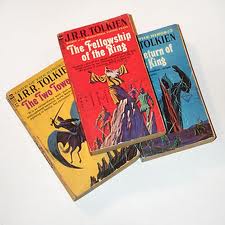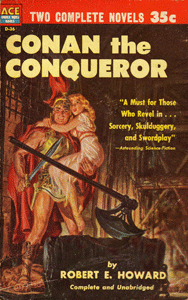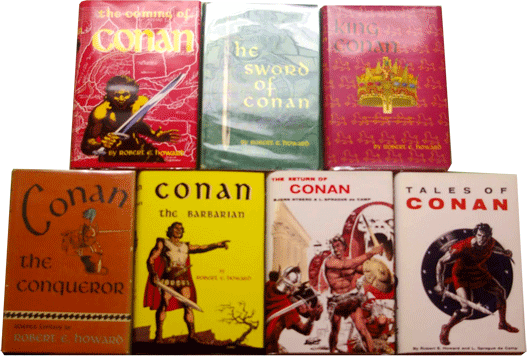This is an old-fashioned topic, Baylor. I don't suppose Tolkien and Howard are linked very often these days, but it's funny to see Tolkien and LOTR being invoked to market Conan back around 1966.
Tolkien and Fantasy: Pre-1970 Paperbacks with Comparisons to Tolkien
Tolkien and Fantasy: Dale Nelson's Summation on Tolkien in pre-1970 blurbs
My sense is that Howardian swords-and-sorcery is just about played out as far as big publishers are concerned, i.e. that it's old-time REH fans and small-press folk who keep working in the genre. On the other hand, I attribute largely to the influence of Tolkien and to authors who were imitating him the proclivity of publishers to desire, and writers to supply, the endless swarm of "trilogies" and series books in sf as well as fantasy that we have today, and which I, though a devoted Tolkien fan, veteran of 13 readings of LOTR, etc., find really unattractive.
http://www.sffchronicles.co.uk/forum/547783-which-books-dont-do-it-for-you-2.html#post1803160
I don't mean to be snide, but accurate, in saying that an imaginative 15-year-old can write a passable Howard imitation -- and many of us have -- but no one can match Tolkien, and the best fantasists are those who may be influenced by him but who have a lot of their own substance to bring to the typewriter. I think of Ursula Le Guin's first three Earthsea books, for example.
Much of what I've written is my impressions, so perhaps someone will correct me.
I think that, without Howard and, especially, Tolkien, modern fantasy as a publishing niche would not be the presence that it is -- for one thing, those Jackson movies wouldn't have been made, and they must do something to keep the field of fantasy publishing going.
That's mostly a quantitative observation. Qualitatively, Tolkien showed that the imaginative romance can still profoundly move modern readers and affect their very lives. I have no doubt that reading Tolkien affected my inner world for good, for life, ever since around 1966. I think many people felt differently about the natural world after they immersed in Tolkien; yes, I think he not only benefited from, but contributed significantly to, the development of a responsible mass movement for respecting and cherishing the natural world. See the book by Dickerson and Evans (far better than its cutesy title),
Ents, Elves, and Eriador.
http://www.sffchronicles.co.uk/forum/532928-tolkien-and-agrarianism.html
Howard accomplished nothing comparable to that. If he had never written anything, you could still get a lot of Howard-type excitement, at least at a young age, from the Barsoom books of Edgar Rice Burroughs and so on, though one grants that his mixture of violent heroes, Theosophical notions about race and so on, and monsters was his own.




